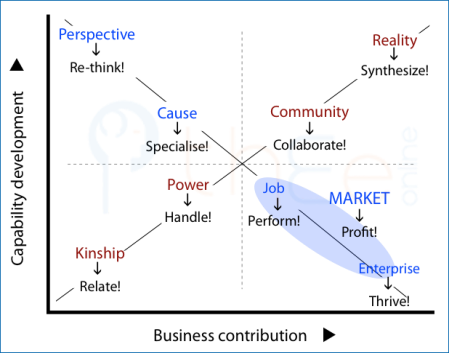Benefits for the Employer
Integration & Mutual Influence
The may be incompatible, but an organization (like any social system) has a capacity and the need to integrate incompatible Types within itself. These Types must be enabled to influence each other. Such integration and influence can occur by seeing any Type as possessing both «content» = methods, and «context» = social values = the Mode. ![]() More ►
More ►
The diagram shows some typical imperatives that flow from particular Types. They are compatible work values that should be acceptable to all.

Synthesis of Modes
This section of the site will explain the specific order that the Modes naturally emerge so as to be personally and socially incorporated. The construction of the Framework has two main features:
-
identifying each Mode’s values (principles, assumptions, axioms) based on the corresponding Type;
&
- recognizing the effects on the person &/or the organization, and hence the crises and challenges that emerge and need to be solved in relation to the Mode.
The principles of the Mode emerge from the Type, and in this framework are about:
- :
- the challenge (i.e. what is essential and usually difficult)
- the benefit sought by addressing the challenge
- the means for handling the challenge
- :
- dealing with groups
- dealing with individuals
- :
- the requirement for significant success
- the response to inevitable failures
Clarifying made individuals and their willed interactions the focus of inquiry. Type-specific or mind-sets belong uniquely to individuals, not the system. Incompatibility of Types shows in social life by dislike, disapproval or open hostility between people. But, everybody can and does at times use several of the Types.
As explained in the Example above, everyone supports certain values epitomized by the Types.
When we shift our frame of reference to a social system, like an organization, it is evident all Types are needed to ensure that the full range of actual or potential issues and situations can be handled effectively by someone. As a result, co-workers with different find a way to co-exist more or less comfortably, with each making their own contribution to organizational goals.
-
Careers start in Stage-1: Doing the Job.
Originally posted: July 2009